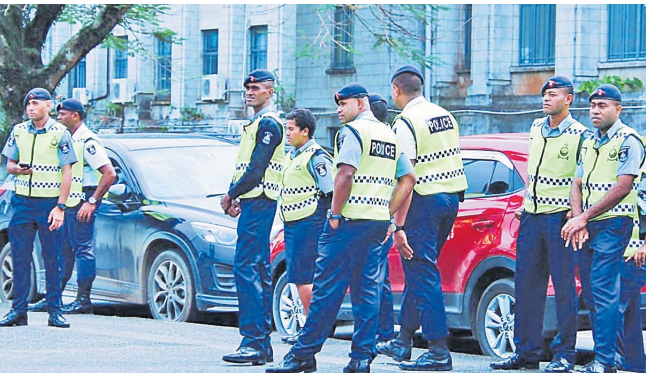Eight ministries and departments in Fiji are labelled as high risk and therefore undergo thorough audits by the Office of the Auditor-General (OAG). These ministries and departments are:
n Ministry of Rural and Maritime Development and National Disaster Management;
n Republic of Fiji Military Forces, Fiji Police Force;
n Ministry of Women, Children and Poverty Alleviation;
n Ministry of Agriculture, Ministry of Infrastructure and Transport;
n Ministry of Education, Heritage & Arts, Higher Education Institutions; and
n Ministry of Health & Medical
Services.
Their audit reports then fall on the laps of the Public Accounts Committee (PAC) of Parliament that further examines the performance and accountability of these ministries and departments.
IN a report tabled in the last sitting of Parliament, the Public Accounts Committee has provided a snapshot of each ministry and department, pointing out areas of improvements. PAC said they are treated as high risk due to:
n large year-end transactions;
n high budgetary funding;
n being implementing agencies for government policies;
n extremely complex transactions specialised nature of operations; and
n for continuous lack of good internal control practices.
PAC said that after the audit of the 2018 and 2019 accounts the OAG reported on significant matters and deficiencies it identified and provided recommendations. This included control weaknesses which could cause or is causing severe disruption to the process or on the ability of the ministry or department to achieve process objectives and comply with relevant legislation.
“As a summary result after and during the 2023/2024 audit for the 2018 audit recommendations, only 81 per cent of the recommendations were fully implemented, 14 per cent were partially implemented and 5 per cent were not implemented at all,” said PAC. For the 2019 audit recommendations, only 72 per cent were fully implemented, 24 per cent were partially implemented and 4 per cent were not implemented at all.
However, after the committee’s consultations with the eight ministries and departments in 2024 and 2025, it has been confirmed that these agencies have both shown progress in their implementation and that some issues dating back to 2018 2019 hadn’t been resolved while some that had been resolved re-occurred.
For the Ministry of Rural and Maritime Development and National Disaster Management, PAC found there were:
n significant arrears of revenue-partially implemented;
n impact and sustainability assessment-partially implemented; and
n rural housing assistance program-partially implemented and income generating projects (self help program) not sustainable-partially implemented.
The Public Accounts Committee said the Republic of Fiji Military Forces lacked effectiveness of internal audit function that were partially implemented, irregularities in processing payments-partially implemented, absence and authenticity of competitive quotations and charging of expenditures to incorrect allocations.
For the Fiji Police Force, PAC found the Water Police Unit was partially implemented. It also said Fiji police had:
n variance in revenue records that are not yet implemented;
n Police trust fund issues yet to be resolved;
n significant outstanding operating trust fund balances existed;
n force management of stores partially implemented;
n storage of exhibits was still an issue and partially implemented;
n procurement of meals for persons in police custody-partially implemented; and
n police clearance revenue variance-not yet resolved.
For the Ministry of Education, Heritage and Arts & Higher Education Institutions, PAC found ration rates for boarding schools were partially implemented and still undergoing a review since 2017.
Ministry of Health and Medical Services had issues with anomalies noted in free medicine program that were partially implemented and had recurring issues. PAC said the Fiji Pharmaceutical and Biomedical Services still had partially implemented and recurring issues that were pointed out by the Auditor-General.
PAC found the Ministry of Infrastructure and Transport still had absence of disaster recovery plan, which was not implemented, anomalies in reporting of trade and manufacturing account persisted and was not implemented as it awaits a court verdict.
PAC found the Ministry of Agriculture and “The committee in its deliberations found that necessary action should be taken to fully implement the remaining recommendations. There is a possibility that permanent secretaries of some agencies have not been regularly updated on the status of the implementation of recommendations by their accounting heads as required,” said PAC.
“The committee noted weaknesses relating to supervision and monitoring of the accounting function. The implementation rate can be improved if recommendations made in this report are implemented and outstanding audit issues are included in the agenda of all monthly meetings of agencies. This can be achieved by the formation of audit committees by permanent secretaries.
“The role of the audit committee could be expanded to include findings or internal audits and matters relating to risk of agencies. The committee also noted and called on permanent secretaries as chief accounting officers and their respective finance head to act more responsibly with utilisations of funds.”
After reviewing the audit report, PAC said its attention is drawn to some ministries and departments that continue to delay the implementation of audit recommendations, and necessary action should be taken to fully implement the remaining recommendations.
“Given the time, permanent secretaries in their capacity as chief accounting officers of ministries and departments need to work closely with the Office of the Auditor-General to address those audit issues that were raised to later remove them from being considered high risk.”



